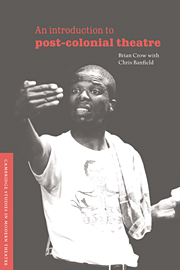Book contents
- Frontmatter
- Contents
- Preface
- Acknowledgements
- Introduction
- 1 Derek Walcott and a Caribbean theatre of revelation
- 2 August Wilson's theatre of the blues
- 3 Jack Davis and the drama of Aboriginal history
- 4 Wole Soyinka and the Nigerian theatre of ritual vision
- 5 Athol Fugard and the South African ‘workshop’ play
- 6 Badal Sircar's Third Theatre of Calcutta
- 7 Girish Karnad and an Indian theatre of roots
- Conclusion
- Further reading list
- Index
Introduction
Published online by Cambridge University Press: 26 February 2010
- Frontmatter
- Contents
- Preface
- Acknowledgements
- Introduction
- 1 Derek Walcott and a Caribbean theatre of revelation
- 2 August Wilson's theatre of the blues
- 3 Jack Davis and the drama of Aboriginal history
- 4 Wole Soyinka and the Nigerian theatre of ritual vision
- 5 Athol Fugard and the South African ‘workshop’ play
- 6 Badal Sircar's Third Theatre of Calcutta
- 7 Girish Karnad and an Indian theatre of roots
- Conclusion
- Further reading list
- Index
Summary
At its peak in the 1930s the British Empire covered almost a quarter of the world's land surface and embraced nearly a quarter of its population. It spanned every continent except Europe. If the United States had been long lost – and had already replaced Britain as the world's most powerful economic and political force – it still retained Canada and its Caribbean territories, Iraq and Egypt as its main colonies in the Middle East, large possessions in West, East and Southern Africa, a string of Asian colonies the jewel of which was India, and Australia and New Zealand. The nature and status of these constituents of empire were extremely varied. Canada, South Africa and Australasia, like the United States before them, had been settled by whites who had either decimated the indigenous peoples in their push for territorial expansion and their desire to reproduce European society, or ruthlessly exploited and controlled them: these white ‘dominions’ had already been granted ‘responsible’ government under the Crown. Britain's main Arab colonies were acquired as part of the colonial redivision after the First World War, and were soon to be granted their political if not entirely their economic independence (Iraq in 1932, Egypt in 1936). The tropical colonies of the Caribbean, Africa and Asia, except for the very special case of India, were ruled by governors and colonial officials without any prospect of the natives participating in government, at least within the foreseeable future. India was different for several reasons, not least the sheer size of the country and its population and the fact that it was already a highly developed military empire before the British arrived.
- Type
- Chapter
- Information
- An Introduction to Post-Colonial Theatre , pp. 1 - 17Publisher: Cambridge University PressPrint publication year: 1996

